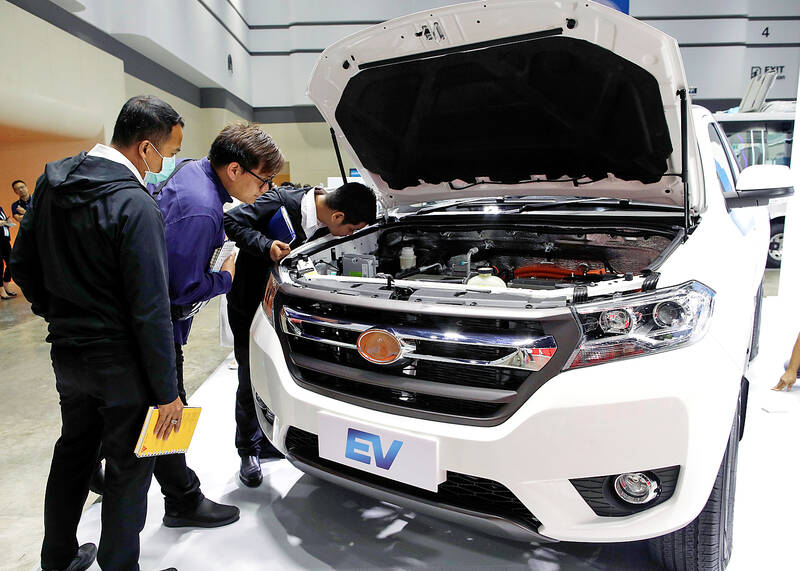Canadian Prime Minister Justin Trudeau’s government has published options it will consider for deterring Chinese-made electric vehicles (EVs) from accessing the Canadian market, including putting tariffs on imported and blocking Chinese investment in new Canadian factories.
Trudeau’s government appears to only be considering tariffs on finished vehicles, based on the document released on Tuesday. The list of items that could see tariffs doesn’t include batteries or battery components, for example.
The paper was released as part of the formal consultations Canada must conduct before imposing tariffs. Those consultations, announced by Canadian Minister of Finance Chrystia Freeland last week, will seek feedback from stakeholders including labor unions and automotive industry groups, and will run until Aug. 1.

Photo: Rungroj Yongrit, EPA-EFE
Canada’s EV industry is “at risk of being undermined by the significant recent increase in exports of Chinese EVs to the Canadian and global markets, enabled by unfair support through China’s use of a broad range of non-market policies and practices,” the consultation paper says.
The Chinese policies include “pervasive subsidization, including of the supply chains of necessary components, problematic or non-existent labor and environmental standards, and other measures to artificially lower production costs, which is leading to significant overcapacity in Chinese EV production,” the document says.
The paper doesn’t provide potential tariff rates and instead asks for feedback on what those may be for various vehicle classes. It also seeks comment on how tariffs might affect EV affordability in general.
In another section, the paper considers the possibility that “Chinese companies could seek to establish facilities to manufacture EVs within Canada” in an attempt to “access the North American market in light of potential tariff measures.”
The document asks for feedback on whether “additional actions like further policy guidance, monitoring, or restrictions related to transactions and investment from Chinese sources in the Canadian EV supply chain are required.”
Two other areas are outlined for feedback. One is whether Canada should make Chinese-made EVs ineligible for federal consumer incentives. The other is on data privacy and security considerations for connected vehicles and related infrastructure.
In considering tariffs and other measures, Canada is following in step with its allies. The US unveiled plans this spring to nearly quadruple US tariffs on Chinese-manufactured electric vehicles, up to a final rate of 102.5 percent. The European Union also plans to increase tariffs, taking those levies as high as 48 percent on some vehicles.
Although the value of Chinese EVs imported by Canada has surged recently, there has so far been little activity involving Chinese domestic vehicle makers.
The vast majority of Canada’s EV imports from China are Tesla Inc vehicles produced from its Shanghai factory. Freeland wouldn’t comment on whether tariffs might apply to those vehicles.

The US dollar was trading at NT$29.7 at 10am today on the Taipei Foreign Exchange, as the New Taiwan dollar gained NT$1.364 from the previous close last week. The NT dollar continued to rise today, after surging 3.07 percent on Friday. After opening at NT$30.91, the NT dollar gained more than NT$1 in just 15 minutes, briefly passing the NT$30 mark. Before the US Department of the Treasury's semi-annual currency report came out, expectations that the NT dollar would keep rising were already building. The NT dollar on Friday closed at NT$31.064, up by NT$0.953 — a 3.07 percent single-day gain. Today,

‘SHORT TERM’: The local currency would likely remain strong in the near term, driven by anticipated US trade pressure, capital inflows and expectations of a US Fed rate cut The US dollar is expected to fall below NT$30 in the near term, as traders anticipate increased pressure from Washington for Taiwan to allow the New Taiwan dollar to appreciate, Cathay United Bank (國泰世華銀行) chief economist Lin Chi-chao (林啟超) said. Following a sharp drop in the greenback against the NT dollar on Friday, Lin told the Central News Agency that the local currency is likely to remain strong in the short term, driven in part by market psychology surrounding anticipated US policy pressure. On Friday, the US dollar fell NT$0.953, or 3.07 percent, closing at NT$31.064 — its lowest level since Jan.

The New Taiwan dollar and Taiwanese stocks surged on signs that trade tensions between the world’s top two economies might start easing and as US tech earnings boosted the outlook of the nation’s semiconductor exports. The NT dollar strengthened as much as 3.8 percent versus the US dollar to 30.815, the biggest intraday gain since January 2011, closing at NT$31.064. The benchmark TAIEX jumped 2.73 percent to outperform the region’s equity gauges. Outlook for global trade improved after China said it is assessing possible trade talks with the US, providing a boost for the nation’s currency and shares. As the NT dollar

The Financial Supervisory Commission (FSC) yesterday met with some of the nation’s largest insurance companies as a skyrocketing New Taiwan dollar piles pressure on their hundreds of billions of dollars in US bond investments. The commission has asked some life insurance firms, among the biggest Asian holders of US debt, to discuss how the rapidly strengthening NT dollar has impacted their operations, people familiar with the matter said. The meeting took place as the NT dollar jumped as much as 5 percent yesterday, its biggest intraday gain in more than three decades. The local currency surged as exporters rushed to